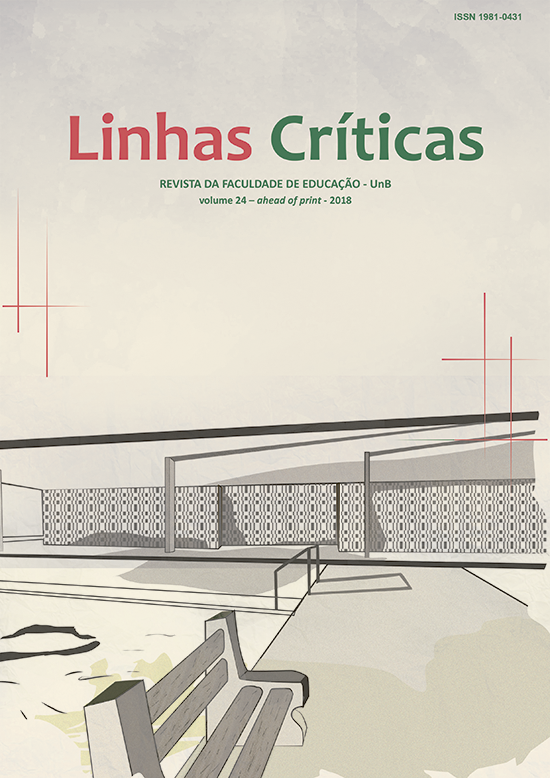The look of the others about obesity
a learning about the rejection
DOI:
https://doi.org/10.26512/lc.v24i0.18958Keywords:
Obesity, Learning about the body, StigmaAbstract
The present study in the field of phenomenology shows in biographical fragments of an obese in the city of Salvador, Bahia, a socio-cultural panoptic construction that mercilessly judges obesity, inscribing it as an experience of suffering, learning and therapeutic support for self-care. 'Obesity and the world' is how this human set is defined without subject / object duality. This dual breakdown takes place in the construction of belonging between one and the other, reciprocally. The world surrounds obesity and this constitutes itself as being-obese-being in a process of belonging in everyday life. It is, therefore, a temporary event in which the obese remains in its constitutive origin as a fattening subject, in a fattening society. Apparently, he expects nothing from the other who watches her, but resents. Normal and pathological are confused to veil or unveil obesity as a social symptom. It, the obese, is perceived in a reduction of public space caused by the stigma of the other. The obesity perceived by the look of the other invites the obese to break the impersonality and to turn to itself. In speculating there is no clear reflection, but a conflicting image in which are mixed senses as rejection and self-worth. The look that rejects it is the same one that distances itself and judge’s obesity. Thus, obese when turning against its image, obesity, experiences a unique learning of what can observe and is open with body therapies to experience the body in society.
Downloads
References
Bertaux, D. (2010). Narrativas de vida: a pesquisa e seus métodos. Tradução de Zuleide Alves Cardoso Cavalcante e Denise Maria Gurgel Lavallée. Natal: EDUFRN; São Paulo: Paulus.
CNDSS. Comissão Nacional sobre Determinantes Sociais da Saúde (2006). 1a. Reunião da CNDSS. Brasília, Disponível em: http://www.who.int/social_determinants/resources/ppt_cndss_bz.pdf
Dejour, C. (1993) Travail usure mentale: De la psychopathologie à la psychodynamique du travail. Paris, Bayard Éditions,
Elias, N. (1994). O processo civilizador. Tradução de Ruy Jugmann. Rio de Janeiro: Jorge Zahar Ed.
Ferreira, V. A; Magalhães, R. (2005). Obesidade e pobreza: o aparente paradoxo. Um estudo com mulheres da Favela da Rocinha, Rio de Janeiro, Cad. Saúde Pública, 21(6), pp.1792-1800.
Ferreira. V. A.; Magalhães, R., (2011). Obesidade entre os pobres no Brasil: a vulnerabilidade feminina. Ciência & Saúde Coletiva [en linea]. [Fecha de consulta: 15 de enero de 2018] Disponible en: http://www.redalyc.org/articulo.oa?id=63018472027
Ferreira, V. A., Silva, A. E., Rodrigues, C. A.A., Nunes, N. L.A., Vigato, T.C., Magalhães, R. (2010). Desigualdade, pobreza e obesidade. Ciência & Saúde Coletiva, 15(Supl.1):1423-1432.
Foucault, M. (1999). Vigiar e Punir. O nascimento da prisão. Tradução de Raque Ramalhete. 20 ed. Editora Vozes. Petrópolis.
Gadamer, H-G, (1997). Verdade e Método / Hans-Georg Gadamer; tradução de Flávio Paulo Meurer; Petrópolis, RJ: Vozes.
Goffman, E. (1988). Estigma: notas sobre a manipulação da identidade deteriorada. Rio de Janeiro: LTC.
Goulart, A. C. (2005). Obesidade e fatores associados numa amostra de mulheres em área de exclusão social, na cidade de São Paulo: correlação com índices antropométricos. 2005. (Tese de Doutorado em Emergências Clínicas) - Faculdade de Medicina, University of São Paulo, São Paulo. https://doi.org/10.11606/T.5.2005.tde-27042005-160127
Heidegger, M. (2006) Ser e Tempo. Tradução de Márcia Sá Cavalcante Schuback; Petrópolis: Vozes, 2006.
Maciel, E.S., Sonati, J.G., Moderneze, D.M., Vasconcelos, J.S., Vilarta, R. (2012). Consumo alimentar, estado nutricional e nível de atividade física em comunidade universitária brasileira. Revista de Nutrição, Campinas, 25(6), pp. 707-718.
Marinho, S.P.; Martins, I.S., Perestrelo, J.P.P., Oliveira, D. C. (2003), abril -junho) Obesidade em adultos de segmentos pauperizados da sociedade. Rev. Nutr., Campinas, 16(21) pp. 95-201.
Sant’Anna, D. B. (2016). Gordos, magros e obesos. Uma história do peso no Brasil. São Paulo, Estação Liberdade,184 pp.
Santos, M.A., Diez-Garcia, R.W., Santos, M.L. (2015) A sujeição aos padrões corporais culturalmente construídos em mulheres de baixa renda. DEMETRA: Alimentação, Nutrição e Saúde. (10)4, pp. 761-774.
Souza, E.C. (2006). Pesquisa narrativa e escrita (auto) biográfica: interfaces metodológicas e formativas. In.: Souza, E.C.; Abrahão; M.H.B. (Orgs); Tempos, narrativas e ficções: A invenção de si (135-148). Porto Alegre, EDIPUCRS.
Pinto, S., Bosi, M. L. (2010) Muito mais do que pe(n)sam: percepções e experiências acerca da obesidade entre usuárias da rede pública de saúde de um município do Nordeste do Brasil. Physis [online]., (20)2, pp.443-457.
BRASIL, Ministério da Saúde. (2014). Vigilância de Fatores de Risco e proteção para Doenças Crônicas por Inquérito Telefônico (VIGITEL): http://www.brasil.gov.br/saude/2013/08/obesidade-atinge-mais-da-metade-da-populacao-brasileira-aponta-estudo
World Health Organization (WHO) (2017). Global Health Observatory (GHO) data. Disponível em: http://www.who.int/topics/obesity/en/
World Health Organization (WHO). (2003) Diet, nutrition and the prevention of chronic disease. WHO Technical Report Series 916.
World Health Organization (WHO). (2012, May) Obesity and overweight. Disponível em: http://www.who.int/mediacentre/factsheets/fs311/en/
World Health Organization (WHO) (1997). Obesity: preventing and managing the global epidemic. Report of a WHO Consultation on Obesity. Geneva.
Published
How to Cite
Issue
Section
License

This work is licensed under a Creative Commons Attribution 4.0 International License.
Authors who publish in this journal agree to the following terms:
-Authors maintains the copyright and grants the journal the right of first publication, the work being simultaneously licensed under the Creative Commons Attribution License which allows the sharing of the work with recognition of the authorship of the work and initial publication in this journal.
- Authors are authorized to enter into additional contracts separately, for non-exclusive distribution of the version of the work published in this journal (eg publish in institutional repository or as a book chapter), with acknowledgment of authorship and initial publication in this journal.
-Authorers are allowed and encouraged to publish and distribute their work online (eg in institutional repositories or on their personal page) at any point before or during the editorial process, as this can generate productive changes as well as increase the impact and the citation of published work (See The Effect of Free Access).



